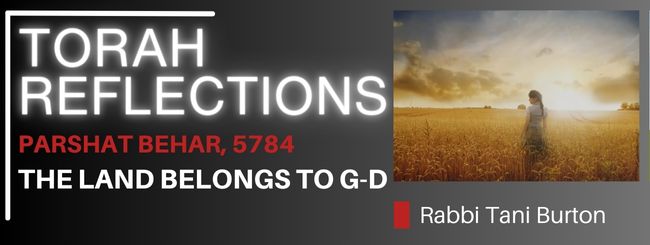בס”ד
Parshat Behar
Integrating Torah into one’s life through reflection and conversation can be an incredibly fun and engaging experience. It’s a journey of discovery, where ancient wisdom and timeless teachings come to life in our daily experiences. Through reflection, we have the opportunity to dive deep into the rich tapestry of Torah, extracting profound insights and lessons that resonate with our modern lives. The joy lies in the ‘aha’ moments, those instances when a Torah verse or story suddenly connects with our personal challenges, aspirations, and values. And when we engage in conversations about Torah with others, it becomes an interactive exploration, where diverse perspectives and interpretations enhance our understanding. These dialogues often spark excitement and intellectual curiosity, making the learning process both enjoyable and fulfilling. Torah becomes a vibrant and dynamic part of our lives, offering not just guidance but also a source of endless fascination, connection, and growth.
NOTE: Don’t feel obligated to go through every source or answer all the questions—unless you want to. Even one source, or one question will give you plenty of material for discussion and meditation. Enjoy this!
Some thoughts from the parsha
The jubilee year, or yovel, described in Leviticus, introduces a unique legal framework where after seven cycles of seven years, the fiftieth year resets property ownership and emancipates slaves. This departure from the conventional notion of perpetual ownership challenges our understanding of possession. The verse “for the land is Mine” emphasizes the transient nature of human ownership, underscoring that ultimately everything belongs to G-d (Leviticus 25:23). This notion is echoed by Rabbi Elazar Ish Bartosa in Pirkei Avos, who urges individuals to render unto G-d what is His, acknowledging that all possessions and abilities are ultimately bestowed by Him (Avot 3:7).
This perspective is relevant to Noahides, who, although not bound by Jewish law, can glean moral insights from its teachings. Recognizing G-d’s ownership and stewardship of all things can guide Noahides in their interactions with the world and others. It promotes humility, responsibility, and generosity, acknowledging that resources and abilities are gifts to be utilized for good.
Expanding on Rabbi Elazar’s statement, “Render unto Him that which is His,” (Avot 3:7) prompts reflection on how acknowledging G-d’s ownership of everything influences our perception of wealth, talents, and abilities. It raises questions about the balance between autonomy and acknowledging dependence on G-d for all that we have.
Moreover, considering the implications of transient ownership challenges prevailing notions of possession and property rights. It does not contradict our understanding of bodily autonomy or the private nature of wealth per se, but it invites examination of our societal structures and values, encouraging a reconsideration of our relationship with material possessions and wealth distribution.
In addition, recognizing G-d’s ownership of all things can inspire a deeper connection to spirituality and a commitment to personal growth. Understanding that our potential for kindness, generosity, and service to G-d exceeds our perception motivates individuals to strive for greater moral and spiritual heights.
Ultimately, the concept of transient ownership and acknowledgment of G-d’s ownership of all things serves as a foundation for ethical living and responsible stewardship, guiding individuals, including Noahides, towards a life of purpose, integrity, and compassion.
Now, reflect upon the following questions
- How does the idea of transient ownership, as depicted in the jubilee year concept, challenge our modern understanding of possession and property?
- Reflecting on Rabbi Elazar’s statement, “Render unto Him that which is His,” how does acknowledging G-d’s ownership of everything impact our perception of wealth, talents, and abilities?
- In what ways can recognizing G-d’s ownership of all things influence our relationships with others and our stewardship of the environment?
- Consider the notion that our potential for kindness, generosity, and service to G-d is greater than we realize. How does this idea inspire personal growth and spiritual development?
- Reflect on the balance between autonomy and recognizing G-d’s ownership in our lives. How can we maintain a sense of individual agency while also acknowledging our dependence on G-d for all that we have?
Shabbat Shalom!
By Rabbi Tani Burton
If you want more questions for contemplation, SEE THE OTHER BLOGS FROM RABBI TANI BURTON ABOUT DE PARSHAT QUESTIONS
© Copyright, all rights reserved. If you enjoyed this article, we encourage you to distribute it further.
Our blogs may contain text/quotes/references/links that include copyright material of Mechon-Mamre.org, Aish.com, Sefaria.org, Chabad.org, and/or AskNoah.org, which we use in accordance with their policies.
